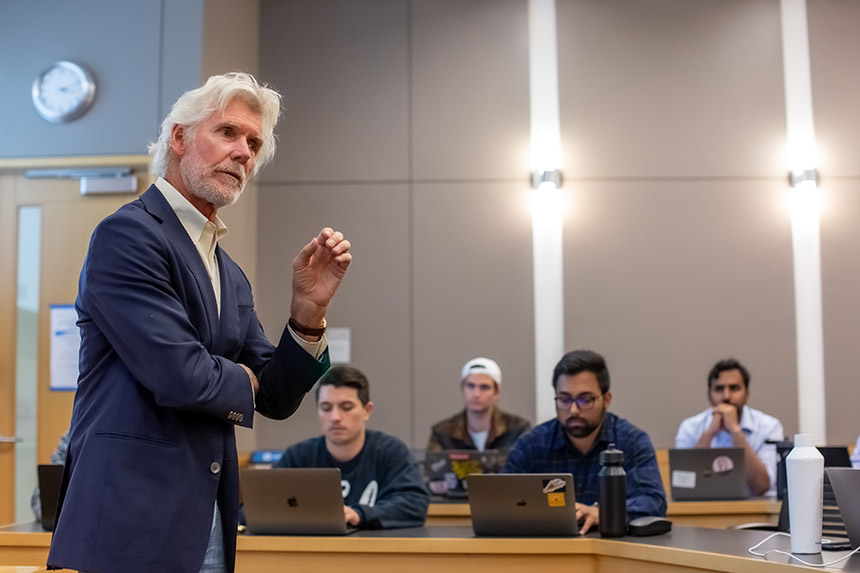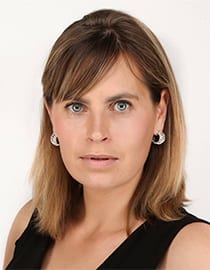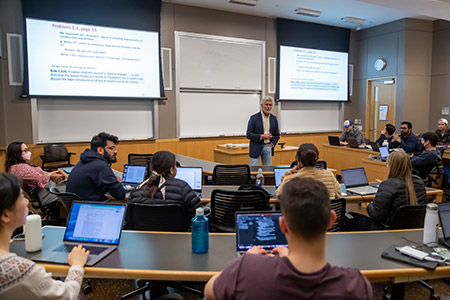
By Gwyneth K. Shaw
Olga V. Mack’s Blockchain for Lawyers course was supposed to be a small one-credit seminar.
But months before the class was even scheduled to start this spring, Berkeley Law students were lobbying her to increase enrollment — to a whopping 85 slots. The course is now less intimate, but Mack appreciates that her pupils share her excitement about the technology.

“I love this tech because it’s powerful and will transform our work and lives in our lifetime,” she says. “So I’ve been on a mission to educate students and the public.”
The vice president and CEO of Parley Pro at LexisNexis, Mack is just one of Berkeley Law’s incredibly deep bench of lecturers. Their primary jobs are as lawyers, advocates, policymakers — even a judge — and they bring a vast spectrum of expertise into the classrooms.
Many niche offerings, from Mindfulness for the Legal Mind to Wine Law, are taught by these part-time faculty. Some teach only one course; others, like Robert Infelise — who’s become a pillar of the school’s environmental law curriculum — teach a variety.
Often beloved additions to a student’s law school experience, many have become icons over long careers teaching at Berkeley Law: Those who serve the school for more than 20 years, and complete 20 or more semesters of teaching, earn the title Dean’s Emeritus Lecturer. Infelise is one of them, as is disability rights legend Arlene B. Mayerson ’77 and Henry Hecht, who was an assistant special prosecutor on the Watergate Special Prosecution Force.
“Our lecturers exemplify the diversity, challenge, and impact of the legal profession,” says Professor Andrew Bradt, associate dean for the J.D. Curriculum and Teaching. “Their dedication to our students, alongside their leadership in an array of fields, is inspiring and critical to our mission.”
‘What could be better?’
McDonald Carano Senior Counsel Rick Trachok has forged a storied career in international regulatory and gaming law. As compliance chair for the German gaming group Gauselmann AG, he helped secure gaming licenses in 200 jurisdictions worldwide. He also chairs the Global Compliance and Governance Committee for the U.K.-based International Game Technology, the world’s largest gaming manufacturer and lottery company.
Trachok has taught throughout his career, and when the opportunity arose in 2017 to come to Berkeley, he jumped at it.
“Being able to draw on a diverse legal career in teaching highly intelligent and motivated students is very rewarding,” he says. “Teaching at Berkeley Law is a career highlight for me. We have the best students and an incredibly talented and collegial faculty. What could be better?”
This spring, he’s teaching Contracts and Sales for LL.M.s and Secured Transactions-Article 9, and in the fall he led Gaming Law: Gambling, Fantasy Sports, Online Wagers, a popular class that consistently fills with students. This fall, he’ll teach Contracts to 1Ls.
The course covers domestic and international state and tribal gaming laws, from land-based casinos and Native American gaming all the way down to state-run lotteries. The booming digital gambling industry, particularly sports betting since the U.S. Supreme Court effectively legalized it in 2018, is of particular interest to students, Trachok says. They also get an overview of administrative law.

“The most fascinating area is the jurisprudence of Indian gaming — the state, federal, and tribal sovereign interests that all intersect in gaming and gambling is so interesting,” Trachok says. “Most of the class would never consider gambling in a casino but they are curious, to one degree or another, about sports betting.”
Practical impact
Mack, who’s taught Financial Statements, Design Thinking, Leadership, and Blockchain Law to law students, LL.M. students, and in the school’s Executive Education Program at various times since 2015, agrees. Former students tell her the courses were life- and career-changing, and many are applying the principles they learned from her daily.
“The hunger for learning and having an impact from day one of practicing law is unparalleled,” she says.
Given how fast the blockchain sector is changing, and increasingly integrated into everyday life, it’s important for Berkeley Law students to access up-to-the-moment information in the classroom, Mack adds.
“As with any other technology, blockchain is like a sharp knife: It can be used to kill, and it can be used to cure,” she says. “That’s why encouraging lawyers — especially enthusiastic, open-minded lawyers — is mission-critical. They can nudge the industry in the right direction from day one.”
Trachok’s practice takes him all over the world, yet he always feels at home in the classroom.
“As a teacher you can make a real difference in students’ lives. I find the teaching component of my professional life the most rewarding,” he says. “There is a German saying: Lerhren heißt zwei mal Lernen: to teach is to learn twice. I find this to be absolutely true.”